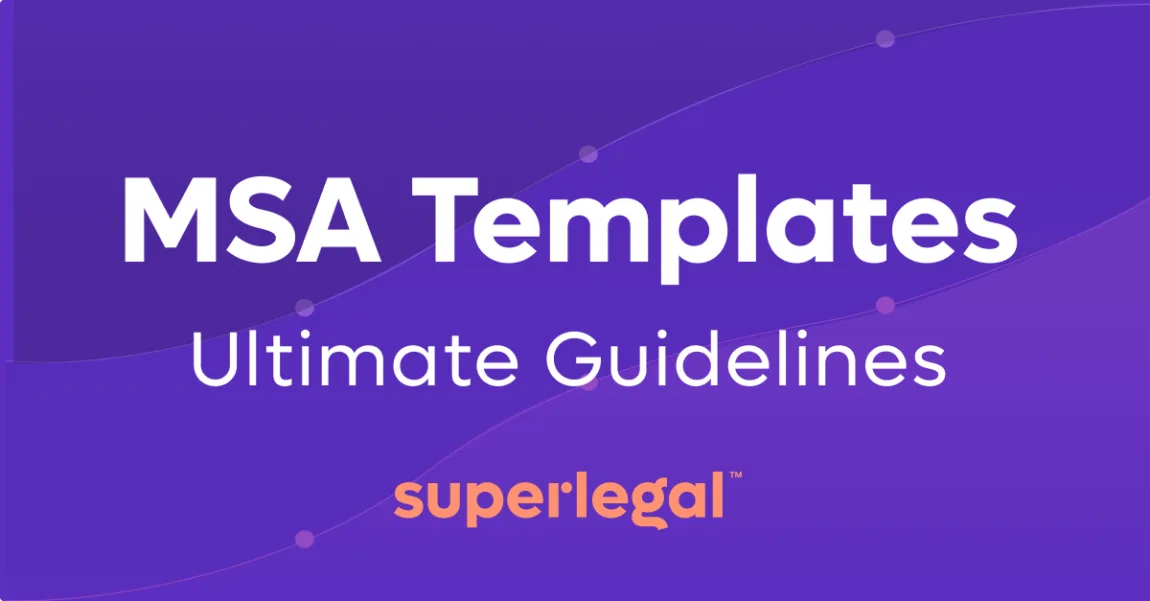Every business partnership must start with a contract.

Many contracts are created and signed for one-time actions or one off projects between parties – but what happens when the parties would like the relationship to be ongoing?
When the parties know that they’d like to continue to work together in the future, a Master Services Agreement (MSA) is the ideal contract format to simplify those future agreements and speed up the negotiation process.
Drafting, reviewing, negotiating and ultimately signing an MSA can be a lengthy and complex process.
Your MSA should:
a) create the basis for a productive and rewarding relationship with your business partner
b) serve your highest business interests; and
c) ensure you’re legally covered when it comes to business risk.
But…how?!
It all starts with a killer Master Service Agreement Template.
A Master Service Agreement works as the blueprint for all future negotiations.
Your MSA will govern the framework of your overarching business relation for years to come – so it’s super important to get your Master Service Agreement Template right!
We’ve got EVERYTHING you need to know about Master Service Agreement Templates.
Plus – our 15 Clause MSA template Checklist – to create the best starting point when it comes to negotiating your Master Service Agreements.
So your partnerships can flourish (and your agreements protect you) for the duration!

Purpose of a Master Service Agreement
MSAs establish the broad framework of an agreement and the fundamental terms governing your business relationship.
In other words – the purpose of a Master Service Agreement is that it establishes the foundation for all future actions.
MSAs are incredibly useful – because they allow the parties to plan for the future while also speeding up the ratification of future agreements.
MSAs regulate your business partnership on a broad scale – laying the foundations for all subsequent project-specific agreements.
Once an MSA is signed, the parties can use it for years without having to continuously renegotiate its terms. All the fundamentals of your initial agreement can be directly transferred to all future contracts.
Your Master Service Agreement ensures that you and your business partner are totally aligned and on the same page when it comes to your expectations of the relationship and the terms of your collaboration going forward.
While the tech industry uses MSAs most frequently, a Master Service Agreement is appropriate for any long-term, ongoing business relationship.
Master Service Agreement vs Statement of Work
So if an MSA governs the relationship at large – how do you monitor and regulate a specific project’s detailed scope of work?
That’s where a Statement of Work (SOW) comes in.
Whilst your MSA maintains the basic tenets that govern all future contracts, your SOW allows for modifications as circumstances evolve, by addressing only the specific deal at hand.
The SOW provides a detailed look at the project by clarifying: what needs to be done, how, and by whom.

SOWs zero in on the specifics of each transaction, including the scope of work, deadlines, deliverables and costs – serving as a project management tool to help parties stay in sync during the performance of the contract.
So, every service type and unique project will require a completely different Statement Of Work, while the MSA governing the framework of your relationship will stay the same.
An SOW contract complements an MSA and provides the details of each transaction.
Although each contract is unique, your MSA and SOW fit together to complete the agreement between you and your business partner.
SOWs are created for each project, and parties can create multiple SOWs during their time working together.
With the legal terms of the MSA established, parties can quickly and efficiently negotiate individual SOWs.
If permitted by the MSA, one party can terminate one SOW without terminating others – useful when you are working on multiple, independent projects!
Benefits of a Master Service Agreement
An MSA simplifies and streamlines the contract negotiation process.
By establishing the fundamental terms at the outset, both parties create an ongoing business relationship, with the ability to refine their rights, responsibilities and expectations as they go.
Six benefits of a Master Service Agreement
- An MSA allows the parties to plan for the future and adapt to changes in the business landscape.
- MSAs eliminate the pressure of a deadline and give parties time to respond and adjust.
- MSAs are particularly suited to relationships in which the parties expect to do a high volume of business over an extended period of time.
- For both parties, a MSA helps achieve consistency and economies of scale – by aligning its terms across all its customers.
- MSAs are flexible and perfect for allowing long-term relationships to grow and evolve.
- An MSA will protect the parties by outlining the risks each company takes. This allows for an easier process of resolving disputes since the parties already know the terms and can quickly determine fault.
Master Service Agreement Template Checklist
Key Components of a Master Service Agreement
For a successful Master Service Agreement template – it’s all in the details.
Remember – your MSA is the bedrock of your ongoing, long-term relationship.
By covering all contingencies and planning for unforeseen issues, your MSA will guarantee the strength and health of your business relationship.
When it comes to the key components of a Master Service Agreement, focus on the following three areas:
- The collaborative efforts to be undertaken between the parties
- The duties and obligations assumed by each party
- The allocation of risk between the parties in a range of circumstances where conflict may arise
Listing the details as clearly, concisely and unambiguously as possible will help both parties honor their side of the MSA.

15 Clause Master Service Agreement Checklist
- The scope of services – Include the clear definition and scope of the service to be provided under the agreement. Ensure that any changes to the scope of service must be agreed in writing.
- Payment terms – These terms should cover: estimated costs, schedule for payment, details of when payment is due, how payment will be made and how long the payments will continue.
- Termination – Set out a clear end date of the contract, together with circumstances for termination of the agreement and the events that will take place on termination.
- Automatic Renewal – This term is often missing but is one that’s become standard. Consider including a term for automatic renewal for successive periods, for example 5 years.
- Confidentiality – You may consider signing a separate NDA, however your MSA can refer to the duties of confidentiality agreed between the parties, including an agreement not to share any trade or business secrets with outside parties.
- Dispute resolution – Should any issues arise, the MSA should clearly outline how the parties will resolve their conflict – for example by litigation, arbitration, mediation etc.
- Venue of law – The MSA must identify the location where a legal resolution will occur. This could include arbitration or a specific state or federal court.
- Escrow – The parties may decide to place money in a trust, if so, clearly state the circumstances that will allow the other party to retrieve those funds.
- Third-parties – Many projects require the involvement of more than two parties. When this happens, the MSA must stipulate how its terms will apply to third parties, what services and risks will be shared by third parties, and how the parties will indemnify third parties for damages resulting from a breach of the agreement.
- Intellectual Property – This is what makes your business unique and where the value of your business can be found – so it’s really important to keep it protected. Make clear who owns the IP, who can benefit from it and put in place key restrictions around usage.
- Liabilities – Should an incident occur, your MSA must spell out which party will assume the risk. Consider limiting liability in the event of neglect or misconduct to direct damages only, with neither party being liable for indirect damages in any circumstances.
- Indemnification – Indemnity clauses represent a promise, from one party to the other, to compensate them from the risk of harm, liability or loss. Make sure that indemnification obligations are strictly limited to ‘direct damages’ from acts, omissions, negligence or wilful misconduct.
- Insurance – Clearly state how the parties will handle and allocate responsibility for insurance coverage and expenses. Failing to do so could lead to issues and potential conflicts later on.
- Warranties – A warranty is simply a promise you make about the level of service you will be providing under the contract. Ensure that you include an overarching ‘umbrella disclaimer,’ and limit any additional warranties regarding the performance of services to ensuring that reasonable efforts ‘consistent with industry standards.’
- Data protection – Your MSA must stipulate who owns what data and what rights you’ll need in any data that is provided to you via the business arrangement. Unless you handle extremely sensitive data, simply provide that security measures be “limited to standard and best practices in the industry.”
Conclusion
MSAs are a game-changer for any on-going business relationship.
Master Service Agreements establish a fundamental reference point for all future business – and a negotiation template that eliminates the need to recreate new contracts for every project or deal.
With the ideal Master Service Agreement template, you can lay the legal groundwork for the future of your business relationship – whilst being agile and quickly responding to changes.
But how can you draft, review and negotiate the ideal Master Service Agreement templates to ultimately grow your business?!
That’s where we come in.
Superlegal
At Superlegal, we harness the power of AI, verified by top legal professionals to take your Master Service Agreements all the way through to completion.
Our 24 hour turnaround and data-driven negotiation guarantee higher close rates and protect you against legal risk.
Plus – with our new negotiation management feature – you get total visibility and control over the entire negotiation process.
Get data driven contract reviews – plus a negotiation management solution – all whilst saving up to 90% on your legal fees.
Get started with our Free Trial in just a few clicks – and get your first contract back in just 24 hours!
Click here to try Superlegal for FREE!








By entering your email, you agree to our Terms & Conditions and Privacy Policy.